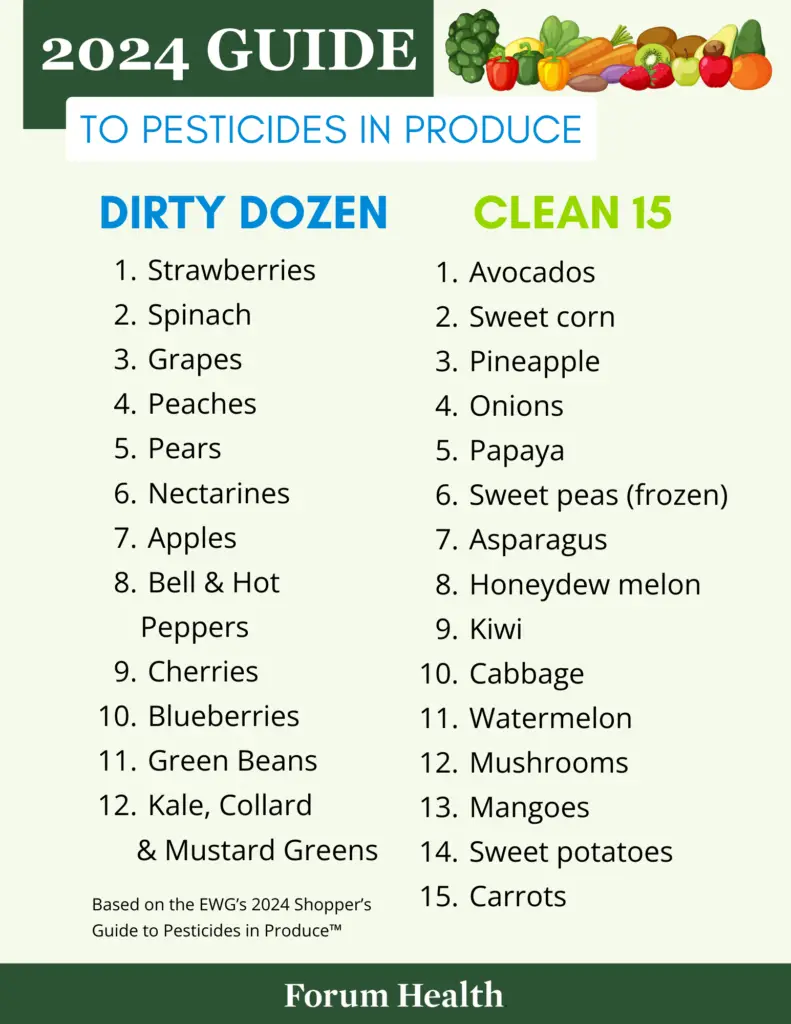Reviewed by Health Coach Carli Webb, MS
The Environmental Working Group has released its 2024 Shopper’s Guide to Pesticides in Produce and we’re giving you the facts on why it matters for your health.
At Forum Health, we are partners in your health and well-being in and out of the clinic. One way we can support you in making healthier choices in your day-to-day is by sharing valuable resources like the Environmental Working Group’s (EWG) 2024 Shopper’s Guide to Pesticides in Produce.
Revised yearly, this guide is essential to helping you reduce your and your family’s exposure to harmful pesticides, which can have significant impacts on your health. Understanding which fruits and vegetables are most and least contaminated can help you make smarter shopping decisions for you and your family.
The 2024 EWG Dirty Dozen and Clean 15 Lists
To compile these lists, the EWG analyzes data from tests conducted by the Department of Agriculture and Food and Drug Administration on 47,510 samples of 46 fruits and vegetables.
From these tests, they break down produce into two main categories. The Dirty Dozen includes the top twelve fruits and vegetables with the highest pesticide residues. And the Clean 15 includes fifteen fruits and vegetables with the lowest pesticide residues.

2024 Dirty Dozen
The EWG’s 2024 guide reveals that a significant percentage of non-organic produce sold in the United States contains pesticide residues. Strawberries are at the top of the Dirty Dozen list, with almost 90% of samples showing pesticide residues. It is recommended that you prioritize buying the produce on the following list organic.
- Strawberries
- Spinach
- Kale, Collard, and Mustard Greens
- Peaches
- Pears
- Nectarines
- Apples
- Grapes
- Bell and Hot Peppers
- Cherries
- Blueberries
- Green Beans
2024 Clean 15
The Clean 15 list includes produce that is safer to consume without buying organic. For instance, avocados and sweet corn show very low levels of pesticide residues, making them safer choices for your family.
- Avocados
- Sweet Corn
- Pineapples
- Onions
- Papayas
- Sweet Peas (frozen)
- Asparagus
- Honeydew Melons
- Kiwis
- Cabbages
- Mushrooms
- Mangoes
- Sweet Potatoes
- Watermelons
- Carrots
Why Shop the Clean 15? Harmful Effects of Pesticides on Health
Pesticides are chemicals used to kill pests that damage crops, but their residues can linger on produce and be ingested by you.
Here are five harmful effects of pesticides on your overall health:
- Endocrine Disruption: Many pesticides are endocrine disruptors, meaning they can interfere with hormone function. This can lead to reproductive issues, developmental problems in children, and increased risk of certain cancers.
- Neurological Issues: Exposure to certain pesticides has been linked to neurological problems, including cognitive impairments and an increased risk of diseases like Parkinson’s and Alzheimer’s.
- Immune System Suppression: Pesticides can weaken the immune system, making it harder for your body to fight off infections and diseases.
- Respiratory Problems: Inhaling pesticides or consuming pesticide-laden produce can cause respiratory issues, including asthma and other chronic lung conditions.
- Cancer: Long-term exposure to pesticides has been linked to various types of cancer, including leukemia, lymphoma, brain, and prostate cancer.
Reducing your exposure to pesticides is crucial for maintaining long-term health and wellness.
By following the EWG’s Dirty Dozen and Clean 15 lists, you can make informed decisions about which produce to buy organic and which are safer to consume in their conventional form.
Additionally, you reduce your risk of the harmful health effects associated with pesticide exposure, support sustainable farming practices that are better for the environment and human health, and get better food quality since organic fruits and vegetables often contain higher levels of certain nutrients and antioxidants, making them a healthier choice overall.
At Forum Health, we encourage you to incorporate these guidelines into your shopping habits. Your health is our priority, and making small changes like these can have a big impact on your overall well-being.
For more tips on healthy living and personalized medical advice, schedule a consultation with one of our health advisors today.
References:
Environmental Working Group (EWG). (2024). Shopper’s Guide to Pesticides in Produce. Retrieved from [EWG’s website](https://www.ewg.org/foodnews/).






